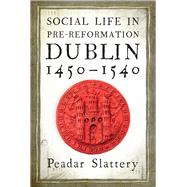Social Life in Pre-Reformation Dublin, 1450–1540
, by Slattery, Peadar- ISBN: 9781846827907 | 1846827906
- Cover: Hardcover
- Copyright: 9/1/2019
This is an account of social life in pre-Reformation Dublin, telling of its ruling class, its wealthy merchants, its all-powerful traditional church, the city's personalities, and Dublin's unwanted Irish. Dublin was an English city run by a local merchant oligarchy. In the 1450s, they set standards of behaviour for the inhabitants. Hearing of the manhandling of one of their bailiffs, the governors of Dublin rode to Howth to defend the honour of Dublin. Yet, Dublin's rulers broke the law, were indicted for counterfeiting, and committed treason by crowning Lambert Simnel as king of England.
The merchants traded in Dublin, in Chester and in the English midlands, and some ventured as far south as Bordeaux. The city rulers faced many urban problems – ensuring water and food supplies for the city, maintaining Dublin's gates and walls, setting up night-watch patrols, regulating its port, and ensuring standards of hygiene. Dublin was threatened by external attacks from the Irish and expulsion was tried on the Irish living in Dublin. The laity loved their traditional Catholic faith and the mysterious magical atmosphere created by the use of candles, darkness, colourful vestments, bells, incense and Latin plainchant. Purgatory threatened but there was the solace of devotion to the Blessed Virgin in Marian liturgies. In civil matters, the church was ruthless, excommunicating members at a rate of two or three a week. The laity were steadily gaining access to the church and were managing parish affairs. The church was attacked by reformers in Dublin, its relics destroyed, its monasteries occupied and its liturgical books censored.







